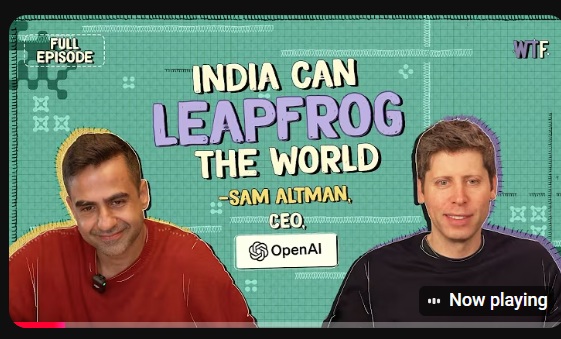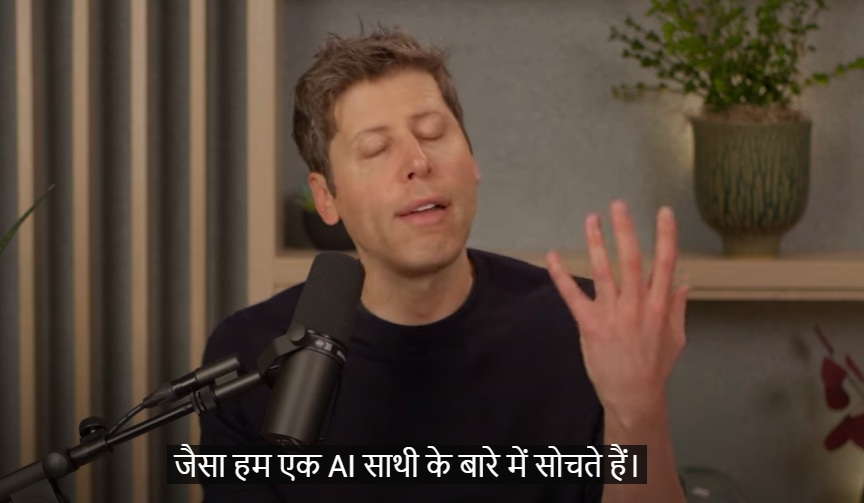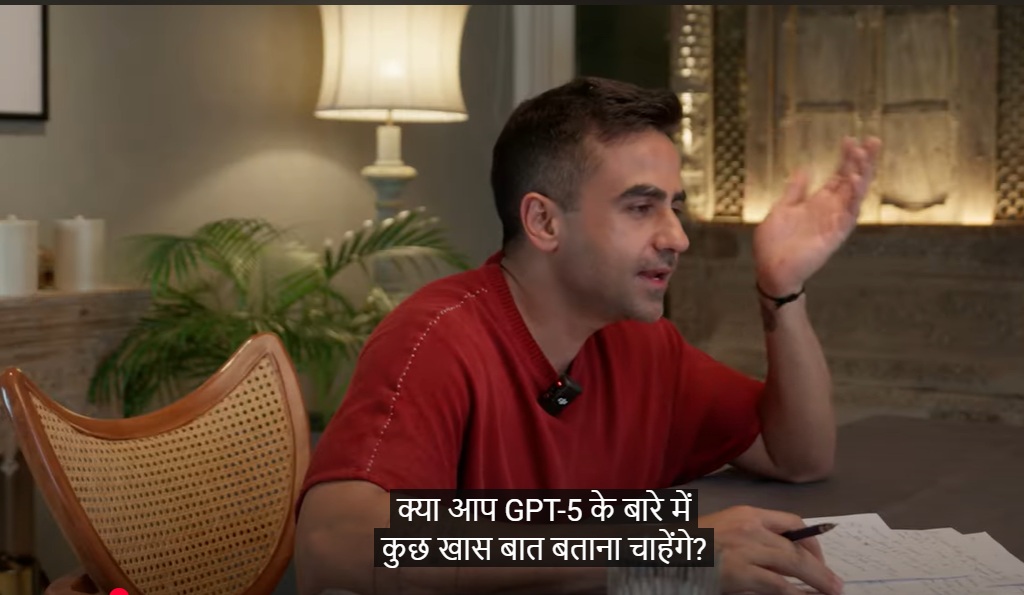Sam Altman Joins Nikhil Kamath to Decode the Future of AI, Work, and Human Identity

FinTech BizNews Service
Mumbai, August 14, 2025: In one of the most anticipated conversations of the year, entrepreneur and investor Nikhil Kamath hosts Sam Altman, CEO of OpenAI, on wide-ranging exchange on the People by WTF podcast.

With Open AI having just launched GPT-5, this conversation unpacks how AI is reshaping entrepreneurship, education, careers, and human identity. Serving as a part roadmap, part reflection, this podcast is for people interested in the AI age. Key discussion areas include:
Why GPT-5 Feels Human:
Nikhil starts the podcast by asking how GPT-5 differs from earlier models wherein Sam explains, “The thing that has been most striking for me is, both in big and small ways, is going back from GPT-5 to our previous generation model is just so painful.” he said. GPT-5, Sam shares, eliminates the need for users to toggle between different models or versions. Describing its capabilities, he added, “It’s like having PhD-level experts in every field available to you 24/7, not only to ask anything but also to do anything for you, write code, generate research, plan an event.” Responding to a follow-up on agentic behaviour and multi-step workflows, Altman notes, “It’s much better at things like that. The robustness and reliability has greatly increased... I’m very impressed by how long and complex of a task it can carry out.” He concluded that GPT-5 represents a significant leap in how people interact with AI across personal, creative, and professional use cases, unlocking not just answers, but execution.
India: AI’s Next Powerhouse:
When Nikhil asks about how India could play a role in shaping the future of AI, Sam says, “India is now our second largest market in the world, it may become our largest,” he noted, citing the scale of adoption and the energy in the ecosystem. He emphasized how feedback from Indian users, across language support, affordability, and access has directly shaped product development at OpenAI. Reflecting on the country's AI potential, Altman said, “If there is one large society in the world that seems most enthusiastic to transform with AI right now, it’s India. The excitement, the embrace of AI…the energy is incredible.” He added that this transformation isn’t just theoretical, it’s already underway: “The entrepreneurial energy around building with AI in India is quite amazing, and we hope to see much more of it.” For India, Sam highlights, the real opportunity lies in moving from consumption to global creation, building tools, platforms, and companies the rest of the world will use.

AI Can Be Your Co-Founder:
When Nikhil Kamath asked what low-hanging opportunities exist for a 25-year-old in India to build on top of GPT-5,Sam was unequivocal: the barrier to entrepreneurship has never been lower. Sam highlights how the model can support almost every function of an early-stage business. “You could use GPT-5 to help you write the software for a product, help you handle customer support, help you write marketing and communications plans, help you review legal documents…all of these things that would have taken a lot of people and a lot of expertise, and you now have GPT-5 to help you do all of this.”
When Nikhil asks Sam whether wrappers built on large language models, such as Harvey in the legal tech space risk being outpaced by the base models themselves, Sam offers a pragmatic take and notes that the outcome often hinges on execution and strategic direction. He cautioned against over-reliance on AI as a differentiator: “Using AI itself does not create a defensible business.” Drawing parallels to past tech waves, he explained that startups must use AI as a launchpad, not a moat.
For the 25-Year-Old Dreamer: Build Bold, Build Now:
When Nikhil asks what a 25-year-old Indians should study or build towards being relevant in the era of AI, Sam reflects on the generational opportunity AI presents. “I think this is probably the most exciting time to be starting out one's career, maybe ever. On industries with the strongest near-term momentum, he said, “I am very excited about what AI is going to mean for science… clearly it's transforming what it means to program computers in a huge way.”
Additionally, Sam shares, “I think the most important thing to study is just getting really good at using the new AI tools.” He continued, “Right now learning how to use AI tools is probably the most important specific hard skill to learn and the difference between people who are really good at really AI native and think of everything in terms of those tools and don't is huge.” He stressed meta-learning over subject choice: “If you get good at learning things you can learn new things quickly.” He further adds, “There's other general skills learning kind of like to be adaptable and resilient which I think is something really learnable that's like quite valuable in a world that's changing so fast.”
The Power of Self-Belief:
Nikhil asks whether Sam’s humility was a deliberate image or a useful stance in today’s world, Sam responded with striking honesty. “When I was 19...I assumed that the people running these big tech companies really had it all figured out and there were, you know, adults in the room and somebody had a plan… everything was being handled by the adults.” But now, as one of those adults, he admitted: “I think no one has a plan. No one really has it all working smoothly… everybody is kind of figuring it out as they go. Everybody is learning on the job.” He clarified “I don't think that's like false humility, I think that's just the way the world works.
Altman emphasized adaptability over bravado, he says, “The number of times we have thought we knew something to get smacked in the face by reality here has been a lot… and when that happens, we change what we're going to do.” His closing insight was clear: “The best founders that I have watched up close throughout my career have all been more like the sort of quick learning and adapting style.”
On Parenthood, Meaning, and the Deepest Human Choice: On the topic of children, Sam responded warmly saying, “It felt like the most important and meaningful and fulfilling thing I could imagine doing.” Reflecting further, he added: “Everyone I know looking back on their life who has had a great career and had a family has either said… that was by far the best thing I’ve ever done… and I was willing to take the leap of faith that that would be true for me too, and it certainly seems like it will be.” When asked about the future of marriage, religion, and family, Sam Altman said: “I hope that creating family, creating community, whatever you want to call it, will become far more important in a post-AGI world.” He added, “It’s pretty clear that family and community are two of the things that make us the happiest, and I hope we will turn back to that.”
On AGI, Deflation, and the Strange Future of Capital: Nikhil asks Sam if AGI-driven productivity could lead to deflation and the erosion of capital’s power, Sam admits, “I feel confused about this.” He explains, “If you like look at the basic economic principles, it’s supposed to be hugely deflationary…and yet if the world decides that, building out AI compute today is super important to things tomorrow, maybe something very strange happens with the economy.” He adds, “Maybe capital is really important because every piece of compute is so valuable.” On interest rates in such a future, Sam speculated: “It should be deflationary eventually, but I could see it being weird in the short term.” When asked if rates could go to minus 2%, he said, “Eventually, but I’m not sure…I find it very hard to see more than a few years in the future at this point.”
On Building Durable Businesses on Top of Foundation Models: Nikhil asks whether companies should fear being cannibalized by foundational models. He draws a comparison to Amazon launching white-labeled versions of popular products. Sam points back to core technological cycles and shares, “We are building this general purpose technology that you can integrate into something in a lot of ways.” The key, he said, is business-model alignment: “If you build a business that gets better when the model gets better, then you should keep doing well… If you build a business where when the model gets better, your business gets worse because the wrapper was too thin or whatever, then that’s bad.”
He acknowledged the pattern is not new. Drawing a mobile-era comparison, he said: “When the iPhone first came out… you could sell a flashlight for a dollar… but eventually Apple just added that into the operating system where it belonged.” He adds, in contrast, “If you started something that was complicated and the iPhone was just an enabler for it, that is a very valuable long-term thing to do.”
On Content, Contrarianism, and the Enduring Value of Being Human:
When Nikhil asks whether being contrarian, to one’s own patterns, would hold more value in a world where models can predict behavior, Sam agrees and shares, “The ability to come up with the kind of contrarian and right idea that the models today just can't do at all... the value of that should go up over time.” When asked what else humans could still do better than AI, Sam explained, “The models are going to be much smarter than we are but there's a lot of things that people care about that have nothing to do with intelligence.” He elaborates, “People really care about other humans. This is very deep. People want to know a little bit about your life story… there's some cultural and social value in that. We are obsessed with other people.” In a world of infinite AI content, Sam offered a provocative closing thought: “Being a real person in a world of unlimited AI content will increase in value.”
On the Difference Between AGI and Human Intelligence:
When asked about the difference between AGI and human intelligence today, and what that gap looks like in the future, Sam explains: “With GPT-5 you have something that is incredibly smart in a lot of domains at tasks that take, you know, seconds to a few minutes.” He added, “It’s very superhuman at knowledge, at pattern recognition, at recall on these shorter-term tasks.” But he acknowledged key limitations: “In terms of figuring out what questions to ask or to work on something over a very long period of time, we are definitely not close to human performance.”
Robots: OpenAI’s Next Platform:
Nikhil asks Sam about the future of robotics, especially amid views that China may be ahead, Sam says, “I think one of the things that is going to feel most AGI-like is seeing robots just walk by you on the street doing kind of normal day-to-day tasks.” On whether robots need to have a humanoid form, he explained: “You can certainly have non-humanoid forms, but the world is really built for humans… door handles, steering wheels in cars, factories—a lot of this is built for… our own kind of morphology.” He concludes, “There will, of course, be other specialized robots too, but the world like is built and I hope stays built for us… so, you know, robots that match that form factor seems like a good idea.” When asked how a young Indian founders could compete in robotics without access to manufacturing scale, Sam acknowledges the challenge but remained optimistic. “I think you probably have to find some really good partners that know a lot about manufacturing.” He also added, “We're interested in robots, so we're thinking about this, and it's definitely a new skill for us to learn.”
On Form Factors, Ambient Computing, and AI Companions:
Nikhil asks Sam on how form factors might evolve in the age of AI “I think what will be defining about the difference of AI versus the sort of previous way we've been using computers and technology, is you really want AI to… have as much context as possible, do stuff for you, and be proactive.” He noted the limitation of today’s devices: “A computer or a phone, it's kind of either on or off… but you might want AI to just be, you know, like a companion with you throughout your day.” He further explains the opportunity: “The current form factors of computers are… not quite right for that… the sort of sci-fi dream of the AI companion.” On what might work better, he said: “You could imagine a lot of things… glasses and wearables and little things that sit on your table… this idea of sort of ambiently aware physical hardware, that feels like it's going to be important.”
On Fusion and the Climate Crisis:
When asked whether fusion could solve the climate change problem, Sam, a known investor in Helion Energy, responded: “I think it certainly helps a lot.” He added a note of caution: “I suspect that we've already done sufficient damage to the climate… we're going to have to undo some damage too, even if we got to switch to fusion right away.” Still, he concluded, “It would certainly be a great step forward.”
About the WTF Podcast:
WTF Podcast, hosted by entrepreneur and philanthropist Nikhil Kamath, is a platform where friends and industry experts engage in casual yet intellectually stimulating conversations. This podcast delves into an array of timely subjects, spanning technology, social media, renewable energy, electric vehicles, philosophy, gaming, psychology, and beyond. Each episode is meticulously curated to provide valuable insights tailored to empower young entrepreneurs venturing into the business world. Recognized for its quality content, WThe podcast hosts 1.38 Million+ subscribers on our YouTube channel with - 300+ Million lifetime views across various channels. The podcast was hailed as the best podcast by Amazon Music and rated as Spotify's "Best Global Video Podcasts" alongside Joe Rogan and Lex Fridman, Guests on the podcast include PM Narendra Modi, Bill Gates, Padma Shri Prashant Prakash, Kumar Birla, Kiran Mazumdar Shaw, and other global thought leaders.